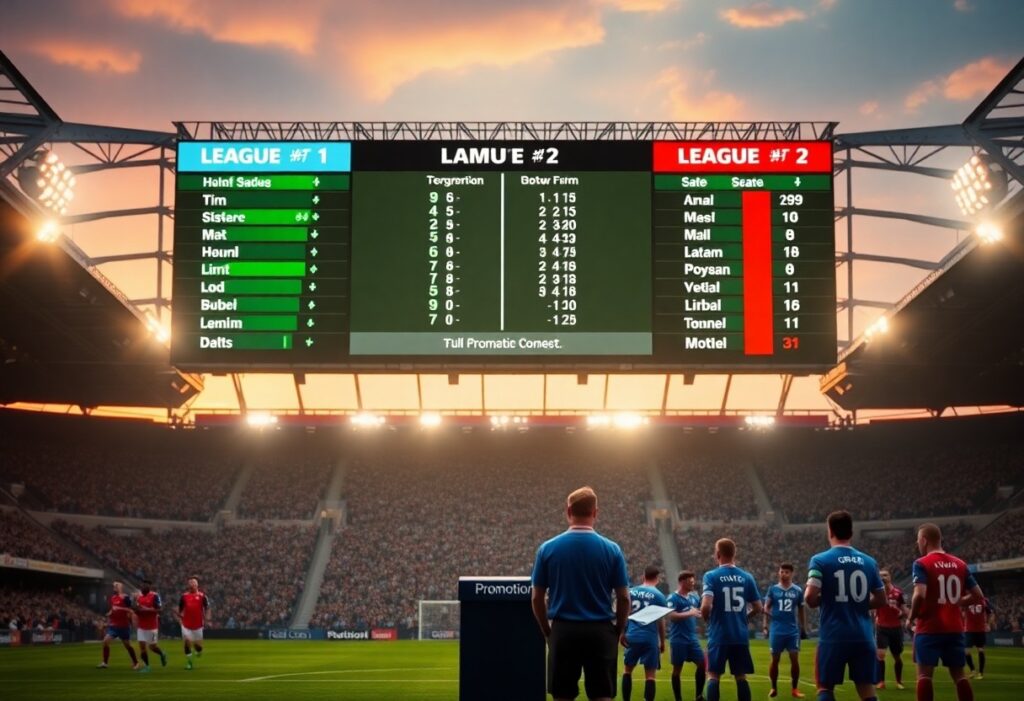
History is filled with remarkable underdog tales that have shaped the UEFA Champions League, showcasing teams that defied the odds to achieve unprecedented success. From overlooked clubs to the rise of unlikely heroes, these stories highlight the passion and determination that fuel the beautiful game. Each account not only emphasizes the competitive spirit of football but also serves as a testament to the power of belief and teamwork in achieving greatness, proving that in this prestigious tournament, anything is possible.
The Rise of the Fabled Underdogs
Throughout Champions League history, the stage has often been set for unlikely heroes to emerge. Underdogs have seized opportunities to challenge the established powerhouses, rewriting the narrative of what is possible on the grandest stage in club football. These moments of triumph resonate deeply, reminding fans of the unpredictable nature of the sport and the extraordinary possibilities within each tournament.
Early Upsets: David vs. Goliath Matches
Historic upsets have defined the early phases of the Champions League, as smaller clubs have dared to dream against heavyweight opponents. Matches such as Deportivo La Coruña’s stunning victory over AC Milan in 2004 showcased the sheer unpredictability of knockout football. Teams like Club Brugge and FC Nantes also claimed shocking advances, proving that skill and determination can dismantle the odds.
Iconic Teams That Defied the Odds
Several teams have become synonymous with the underdog spirit, epitomizing resilience and ambition. Nottingham Forest, conquering Europe in the late 1970s, remains a testament to overcoming the establishment. Similarly, Monaco reached the semi-finals in 2004, defying expectations with a young squad led by Didier Drogba and Jérémy Toulalan, who showcased that emerging talents could shine on the biggest stage.
Iconic teams like FC Schalke 04 in 2011 went from underachievers to fierce contenders, demonstrating their mettle by defeating strong teams like Inter Milan. Their journey through the competition not only highlighted their tactical adaptability but also revealed a deep-seated belief in their potential. Similarly, Manchester United, during their 1999 campaign, embodied the underdog narrative by wrestling the title away from Bayern Munich in a dramatic finale, showcasing the unpredictable twists that make the Champions League so captivating.
Legendary Matches in History
Some matches in Champions League history have transcended mere competition, embodying the essence of underdog triumphs. These encounters not only showcased exceptional talent but also revealed the raw passion and determination of teams that defied expectations. From unexpected victories to intense rivalries, each legendary match contributes to the rich tapestry of the tournament’s narrative, reminding fans that in football, anything is possible.
Unforgettable Comebacks
Few moments in Champions League history resonate as powerfully as unforgettable comebacks, where teams have overturned insurmountable deficits to secure astonishing victories. One notable example is Liverpool’s remarkable turnaround against AC Milan in the 2005 final, where they came back from a three-goal deficit to win on penalties. The tenacity and resilience displayed in these matches leave an indelible mark, showcasing the unpredictability of the competition.
Dramatic Last-Minute Goals
Dramatic last-minute goals have often defined Champions League matches, sealing fates in a heartbeat and igniting jubilation among fans. These pivotal moments, such as Sergio Agüero’s iconic title-winning goal for Manchester City in 2012, illustrate how a single second can transform the trajectory of a campaign, turning despair into elation with one decisive strike.
The impact of dramatic last-minute goals extends beyond mere statistics; they encapsulate the sheer unpredictability and thrilling nature of football. Matches like Chelsea’s 2012 winning goal against Bayern Munich in the final or Ole Gunnar Solskjær’s iconic strike for Manchester United in 1999 highlight the electric atmosphere that erupts in stadiums worldwide. These moments become part of the lore of the Champions League, illustrating how heroes can rise when it matters most, and the game can change in an instant, leaving fans breathless and histories rewritten.
Impact on Team Legacies
Underdog victories in the Champions League often redefine a club’s identity, embedding their achievements into the fabric of football history. Teams that seized unexpected triumphs have transformed from relative obscurity into symbols of determination, inspiring generations. These landmark moments resonate, leading to increased fan loyalty and international recognition, ultimately elevating the status of these clubs within the sport.
How Underdogs Changed Club Histories
Clubs such as Nottingham Forest and Olympique de Marseille have leveraged underdog narratives to reshape their legacies. Nottingham Forest, with their back-to-back titles in 1979 and 1980, emerged from the Second Division to European glory, while Marseille’s 1993 triumph made them the first club to lift the trophy in the Champions League era.
Players Who Emerged Through Adversity
The Champions League has seen players rise to prominence despite facing significant challenges, illustrating the profound impact of these stories on team dynamics. Icons like Gianluigi Buffon, who battled injuries and setbacks, and Didier Drogba, who overcame political strife in his homeland, have not only shown resilience but have also provided their clubs with a sense of belief and determination when the odds were against them.
Gianluigi Buffon’s journey is particularly remarkable; after a series of injuries early in his career, he became a stalwart for Juventus and the Italian national team. At Juventus, he led the club to numerous domestic titles and their first Champions League final in over a decade in 2015. Similarly, Didier Drogba’s rise from the struggles in the Ivory Coast to leading Chelsea to their first Champions League title in 2012 epitomizes the spirit of overcoming adversity. His leadership and performance in pivotal moments not only lifted his team but also inspired countless young players worldwide.
Tactical Masterclasses from Underdogs
Underdogs in the Champions League have often employed tactical ingenuity to outsmart their more illustrious opponents. The effective use of counter-attacking football, disciplined defensive setups, and ambiguity in formations has allowed teams like FC Porto in 2004 and Monaco in 2004 to capitalize on tactical vulnerabilities. Such strategies not only nullified the strengths of favored teams but also created opportunities for stunning victories, showcasing how smart planning can level the playing field.
Innovative Strategies that Shocked Favorites
Many underdog teams have unveiled creative game plans that completely dismantled the strategies of favored clubs. This included using unexpected formations or pressuring high up the pitch, as seen when Leicester City’s swift counter-attacks stunned Sevilla in 2017. Their ability to adapt quickly and seize on every opportunity allowed them to claim remarkable victories against top-tier opposition.
Key Managers Behind Upset Wins
Behind each surprising upset in the Champions League stands a visionary manager capable of harnessing the potential of their squad. Coaches like Claudio Ranieri, who guided Leicester City to their famous victory in 2016, utilized a keen understanding of player strengths, while José Mourinho has consistently employed tactical mastery to upset heavier-hitters during his tenure. These managers not only craft adaptable game plans but foster a mentality of belief within their teams.
Claudio Ranieri’s approach at Leicester City exemplified how a tactical mastermind can pivot a team’s fortunes. He instilled a strong foundation built on disciplined defending and rapid transitions, allowing players like Jamie Vardy and Riyad Mahrez to shine. Similarly, José Mourinho’s tactical flexibility has seen him exploit opponents’ weaknesses, stunning clubs like Chelsea and Manchester United. The ability of these managers to motivate and strategically outperform richer squads often leads to unforgettable moments in Champions League history, demonstrating that brilliance isn’t reserved for the elite.
Fan Reactions and Celebrations
Celebrations following an underdog victory in the Champions League are often a palpable, electric experience, uniting fans in sheer disbelief and joy. Stadiums erupt with a mix of jubilation and surreal disbelief as supporters revel in their team’s monumental achievement, often capturing moments through social media. Streets become rivers of elation as fans partake in spontaneous celebrations, showcasing their unwavering loyalty and unyielding hope in their team’s potential to triumph against the odds.
The Joy of the Underdog Victory
Victory for an underdog ignites a wave of elation that resonates beyond simply the scoreboard. Fans experience a cathartic release, often reflecting years of hardship, fleeting hopes, and unwavering support. Each goal feels monumental, creating a sense of unity and shared purpose among followers who live for such moments of glory.
Cultural Impact of Memorable Wins
Memorable underdog victories in the Champions League profoundly influence culture, transcending the pitch and inspiring narratives of resilience and aspiration. These triumphs become symbols of hope, often celebrated in local folklore and referenced in popular culture, from songs to films, highlighting the capacity for extraordinary achievement against substantial odds.
Such victories serve as pivotal moments that inspire communities and foster identity. For instance, Chelsea’s 2012 win symbolized the club’s transformation and resilience, sparking neighborhood celebrations in London that reverberated worldwide. Similarly, Ajax’s triumphs in the 1990s not only boosted local pride but also influenced youth culture, inspiring generations to aspire to greatness. The stories of triumph from these matches continue to be told, becoming a touchstone in the legacy of football and illustrating the timeless allure of the underdog narrative.
Lessons Learned from Underdog Triumphs
Champions League history is rich with stories that reveal the power of belief, unity, and strategy. Underdogs teach us that success often comes from unwavering resilience and a fierce determination to defy expectations. Each victory proves that overcoming adversity is possible, fostering a mindset that can turn dreams into reality. The emotional rollercoaster of these journeys encapsulates the essence of sportsmanship, where teamwork and grit triumph over mere talent.
Resilience and Determination in Sports
The essence of resilience in sports shines brightly through the triumphs of underdog teams. Their success is marked by the ability to persevere against formidable opponents, often showcasing tenacity in the face of daunting challenges. An exemplar is FC Porto’s 2004 victory under José Mourinho, a testament to how confidence and determination can lead to historic achievements, demonstrating that skill and heart can create a perfect blend for success.
Inspiring Future Generations of Players
Underdog stories from the Champions League resonate deeply with young athletes, inspiring them to dream big and pursue their goals. These narratives reveal that anything is attainable with dedication, hard work, and belief in one’s abilities. When players witness teams like Leicester City’s miraculous 2016 run, they understand that grit can level the playing field against the giants of football.
The impact of these underdog narratives extends beyond just motivation. They provide tangible examples for future players, encouraging them to embrace adversity as a stepping stone toward success. The triumph of Ajax in the 1995 final, featuring a lineup of young talent, reinforces the idea that youth and ambition can disrupt established norms. As aspiring athletes watch these stories unfold, they learn the importance of teamwork, strategy, and mental strength, igniting a passion that can propel them toward greatness in their own journeys.
To wrap up
The Champions League has witnessed numerous underdog stories that resonate with fans across the globe. From remarkable comebacks to unexpected victories, these narratives highlight the unpredictability and excitement of the tournament. Teams like Nottingham Forest and FC Porto exemplify how persistence, strategy, and teamwork can defy the odds. Such stories not only enrich the history of the competition but also inspire future generations of players and supporters, demonstrating that greatness can arise from the most unlikely circumstances.
FAQ
Q: What is the significance of underdog teams in Champions League history?
A: Underdog teams have provided inspiration and excitement in Champions League history by overcoming greater odds and established rivals, showcasing resilience and determination. Their achievements highlight the unpredictability of football, creating memorable moments and rivalries that captivate fans worldwide.
Q: Can you provide an example of an underdog success in the Champions League?
A: One notable example is the 2004-2005 season when Liverpool FC, trailing 3-0 at halftime against AC Milan in the final, staged a remarkable comeback to level the match at 3-3 and eventually won in a penalty shootout. This event is often referred to as the “Miracle of Istanbul” and exemplifies the spirit of underdog triumph.
Q: How do underdog stories impact audience engagement in the Champions League?
A: Underdog stories significantly enhance audience engagement by fostering emotional connections between fans and the teams. The drama of unexpected victories and surprising performances creates a narrative that captivates viewers, encouraging larger audiences and deeper investment in the competition’s outcomes.



